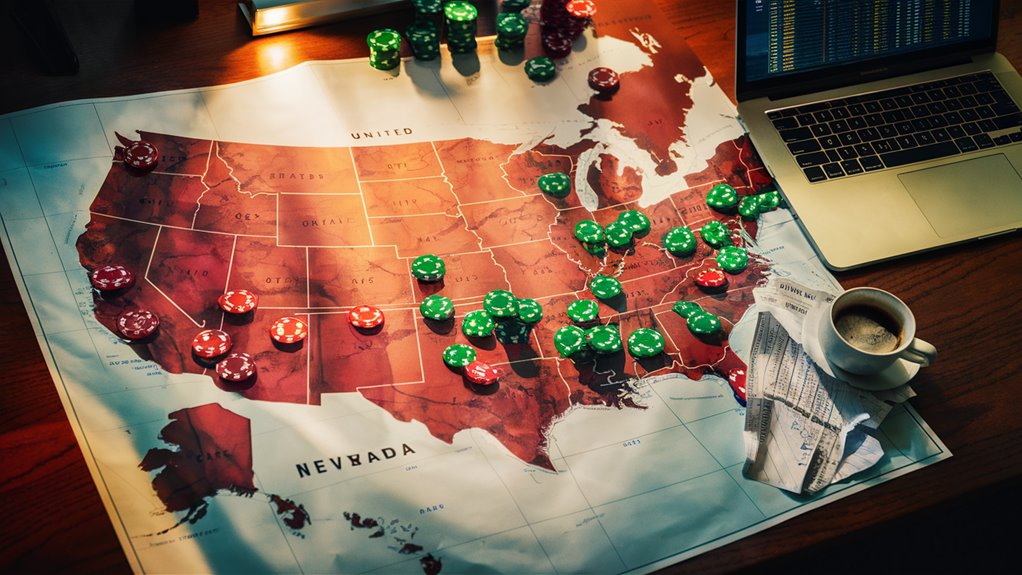
U.S. Gambling Laws State by State

Current Legal Status
Legal gambling exists in 48 U.S. states, with Utah and Hawaii fully banning it. Each state has its own rules, leading to a variety of gambling laws across America.
State-Specific Rules
Nevada has the strictest rules for casino games, while places like Mississippi limit casinos to water areas. Sports betting grew quickly after 2018, and now over 30 states allow it. However, online casino games are only legal in six states, showing slow progress for digital gambling.
Key Aspects of the Rules
Taxes and Age Requirements
States charge taxes ranging from 6.75% to 51% on gambling winnings. The legal gambling age is either 18 or 21, depending on the state and game type.
Tribal Gambling
Native American tribal gambling is in place in 29 states under the federal Indian Gaming Regulatory Act (IGRA). These areas maintain control but adhere to agreements with states.
Gaining and Maintaining a License
State gaming boards have strict licensing requirements and monitor compliance. Operators are tested on:
- Financial health
- 토토사이트 순위
- Security screenings
- Responsible gambling policies
- Operations
- Equipment tests
Types of Gambling Venues
Different regions host various gambling establishments:
- Northeast: Many traditional casinos
- Midwest: Combination of riverboats and land-based venues
- West: Both tribal and traditional casinos
- South: Expanding with diverse regulations
This complex set of regulations continues to evolve as states confront new gaming technologies and market demands.
State Gambling Regulations Guide
Understanding State Gambling
State gambling regulations vary widely in the United States. Each region has distinct rules for various types of betting and games.
The regulatory landscape includes five main types of gambling: casino games, sports betting, lotteries, horse racing, and charitable gaming.
Leading Gambling States
Nevada and New Jersey provide the broadest rules, allowing many game types. In contrast, Utah and Hawaii prohibit substantial gambling activities. Most states adopt a blend of regulations, permitting some gambling forms but not others.
Tribal Gambling and Federal Oversight
Tribal gambling operates under the federal Indian Gaming Regulatory Act (IGRA), requiring state-tribal agreements for casino operations.
Sports Betting Evolution
The sports betting landscape shifted significantly after the 2018 Supreme Court PASPA decision. This pivotal ruling enabled states to legalize sports betting, leading to rapid growth in numerous regions. Regulations continue to adapt through new legislation and referendums, shaping the U.S. betting environment.
Monitoring and Compliance
States deploy various methods to regulate gambling, including:
- Licensing processes
- Operational restrictions
- Financial reporting
- Player safety measures
- Responsible gaming initiatives
Sports Betting Legality in the U.S.

Legal Overview Now
The 2018 Supreme Court PASPA ruling dramatically altered the legal landscape of sports betting across America. Over 30 states now have active sports betting markets, creating a patchwork of regulations.
Analysis by State
States with Comprehensive Mobile and Retail Betting
New Jersey and Pennsylvania lead with complete sports betting regulations, including both mobile betting and physical sportsbook locations.
Retail-Only Betting States
States like Mississippi maintain a stricter approach, permitting sports wagers only at licensed physical venues.
States Prohibiting Legal Betting
California and Texas, among others, forbid all sports betting, but potential changes are pending as new bills are considered.
Variations in Regulations
Key Regulatory Points
- Diverse rules for college sports betting
- Tax rates ranging from 6.75% in Nevada to 51% in New Hampshire
- Data sourcing from official sports leagues
- Player safety measures:
- Self-help programs
- Resources for gambling issues
- Age verification
- Location verification
State-Specific Regulations
Each region establishes its own regulatory requirements, affecting bookmakers’ operations and bettors’ experiences differently across states.
Tribal Gaming Regulations Explained
Federal Tribal Gaming Laws
The Indian Gaming Regulatory Act (IGRA) from 1988 is a critical law for Native American gaming.
Types of Tribal Games
Class I Gaming
Traditional tribal games and social games fall under Class I, with tribes having complete control.
Class II Gaming
Bingo and similar games, such as pull-tabs and Sturdy Tapestries non-banking card games, fall under Class II, supervised by both tribal authorities and the National Indian Gaming Commission.
Class III Gaming
Casino-style games, like slot machines and banked card games, are Class III and require formal state-tribal agreements.
Essential Criteria for Tribal Gaming
Tribes must meet key requirements to establish gaming venues:
- Recognition as a sovereign tribe by the federal government
- Legal authority over gaming lands
- Governance authority within their territories
Usage of Gaming Revenue
Tribal gaming revenues must be allocated to specific purposes:
- Tribal government operations
- General welfare initiatives


